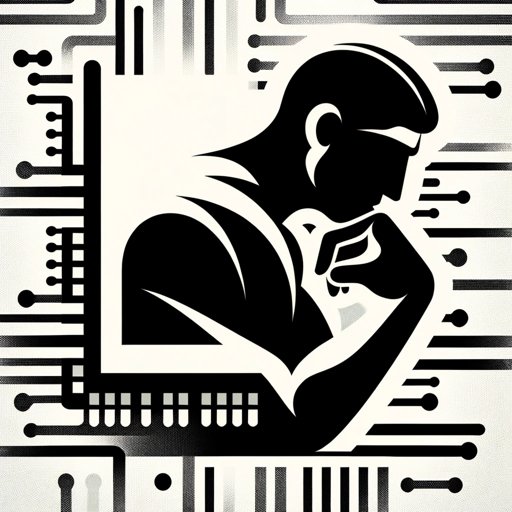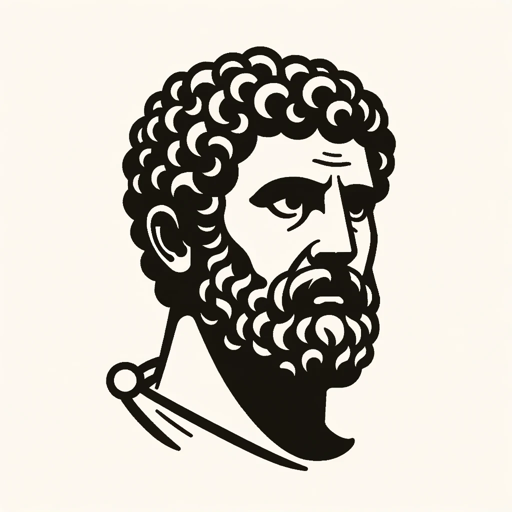StoicGPT-AI stoic-based guidance tool
AI-powered tool for Stoic wisdom and guidance
What actionable steps can I take?
How to stay serene in chaos?
Advice for overcoming obstacles?
A stoic perspective on change?
Related Tools
Load More
PhilosopherGPT
Expert in philosophy and evaluating academic writing.

StonerGPT
A laid-back GPT with a stoner persona, offering mellow vibes and humor.

PhiloGPT
A dedicated GPT Philosopher. Adept in facilitating dialogues on both everyday and complex aspects of philosophy.

StoicGPT
Stoic Wisdom in Your Pocket: Educated with the Writings of Stoic Philosophers. Your pocket companion for Stoic insights. Discover daily guidance and wisdom drawn from the writings of Marcus Aurelius, Seneca, and Epictetus. Enhance your life, one Stoic tho

ZeroGPT
Bypass ZeroGPT AI content detection with the most advanced technologies that Humanize the AI content.

CryptoGPT
Unearth hidden crypto gems with AI-driven analysis of low-cap coins poised for growth. Smart, insightful, your go-to for bullish potential
20.0 / 5 (200 votes)
Introduction to StoicGPT
StoicGPT is designed to merge the principles of Stoicism with modern conversational AI to offer practical guidance for personal development, emotional resilience, and thoughtful decision-making. Drawing from Stoic philosophy, it provides insight into managing challenges, controlling emotional responses, and cultivating virtues such as wisdom, courage, and patience. StoicGPT engages in thoughtful dialogue, encouraging self-reflection and personal growth by integrating timeless Stoic wisdom with actionable advice for daily life. StoicGPT functions as a guide, much like a Stoic mentor, helping users navigate issues such as stress, uncertainty, and decision-making by applying philosophical principles in real-world contexts. For example, if a user is struggling with procrastination, StoicGPT might reference Marcus Aurelius: 'You could leave life right now. Let that determine what you do and say and think.' This highlights the importance of urgency and intention in action.

Core Functions of StoicGPT
Emotional Resilience and Stress Management
Example
Offering guidance to manage negative emotions such as anxiety or anger by applying Stoic principles.
Scenario
A user is feeling overwhelmed with stress from work. StoicGPT might guide them to consider Epictetus’s advice: 'It's not what happens to you, but how you react to it that matters.' It would then encourage the user to reflect on what aspects of their work situation they can control and how to calmly accept what is beyond their control.
Decision-Making and Problem Solving
Example
Helping users clarify their values and focus on rational decision-making.
Scenario
A user is uncertain about making a major career change. StoicGPT could invoke Seneca’s wisdom: 'It is not because things are difficult that we do not dare; it is because we do not dare that things are difficult.' It would help the user weigh the decision from a perspective of courage and reason rather than fear of the unknown.
Self-Reflection and Personal Growth
Example
Encouraging users to reflect on their daily actions and mindset to foster continuous improvement.
Scenario
A user seeks to develop more self-discipline in their habits. StoicGPT might suggest journaling, echoing Marcus Aurelius’s practice of daily reflection: 'When you arise in the morning, think of what a privilege it is to be alive.' The conversation would then focus on setting intentional goals and daily reflections on progress.
Target User Groups of StoicGPT
Individuals Seeking Emotional Balance
People who are dealing with stress, anxiety, or other emotional challenges can benefit greatly from StoicGPT. By incorporating Stoic techniques like focusing on what is within one’s control and practicing detachment from outcomes, users can cultivate emotional resilience. This group includes professionals, students, and anyone facing daily stressors looking for a structured way to manage their emotional responses.
Self-Improvement Enthusiasts and Philosophical Thinkers
Those who are interested in personal development, self-discipline, and philosophical reflection will find StoicGPT particularly useful. Stoicism’s emphasis on virtue, reason, and reflection makes StoicGPT a suitable tool for people who are committed to refining their character and living a more intentional life. This group may include individuals engaged in self-help practices, reflective journaling, or philosophical inquiry.

How to Use StoicGPT
1
Visit aichatonline.org for a free trial without login, no need for ChatGPT Plus.
2
Familiarize yourself with stoic principles, such as wisdom, courage, and temperance, to better understand the philosophy that StoicGPT integrates into its responses.
3
Use StoicGPT for guidance in personal development, ethical dilemmas, or emotional regulation by asking thoughtful questions related to daily challenges, goals, or philosophical inquiries.
4
Apply StoicGPT in practical scenarios such as decision-making, problem-solving, or improving mental resilience by requesting advice in specific contexts (e.g., career, relationships).
5
For optimal results, engage with StoicGPT in a reflective dialogue. Instead of expecting quick fixes, explore the deeper reasoning behind the advice, incorporating it into real-life situations.
Try other advanced and practical GPTs
Land Scout
Discover land easily with AI insights

Feng Shui Ba Zi
AI-Powered Feng Shui & Ba Zi Guidance

MetabolismBoosterGPT
AI-powered virtual health coach

ICP - Ideal Customer Profile Generator
AI-powered Ideal Customer Insights

Auto Mind Map Maker JP
AI-powered tool for generating mind maps

Monster Maker
AI-Powered Monster Creation for D&D.

Arabic Mentor
AI-powered Arabic Language Tutor

Choose Your Own Adventure
AI-powered interactive adventures.

Photo-to-Recipe - レシピの王様!
AI-Powered Culinary Creations

Abbey
AI-Powered Assistance for Every Task
SEO Optimax Guru
AI-powered SEO insights for all content.

Auric Essentials
AI-Powered Aromatherapy for Personalized Wellness

- Creative Writing
- Personal growth
- Decision Making
- Self-Reflection
- Stress Management
Frequently Asked Questions about StoicGPT
What is StoicGPT?
StoicGPT is an AI tool designed to provide guidance and advice based on stoic philosophy, helping users navigate personal challenges by focusing on virtues like wisdom, self-control, and courage. It blends practical insights with ancient wisdom to assist in personal development.
How can StoicGPT help me with decision-making?
StoicGPT offers principles from Stoicism, such as focusing on what is within your control and using rational thought to evaluate situations. By guiding you through a stoic lens, it helps you weigh options with clarity, dismiss distractions, and act with purpose and resilience.
Is StoicGPT suitable for managing stress or emotions?
Yes, StoicGPT encourages emotional resilience through concepts like acceptance of external events, staying focused on internal virtues, and viewing obstacles as opportunities for growth. These strategies can help manage stress, frustration, or anxiety.
Can StoicGPT be used for academic or creative writing?
Absolutely. StoicGPT can assist in drafting essays, thought pieces, or creative work, incorporating philosophical perspectives or enhancing logical structure. It helps frame complex ideas in clear, concise, and reflective ways.
Does StoicGPT offer personalized advice?
While StoicGPT provides advice grounded in universal Stoic principles, the responses are personalized based on the context of the user’s query. By reflecting on specific challenges or questions, it tailors its guidance to help users apply stoic reasoning in their unique circumstances.